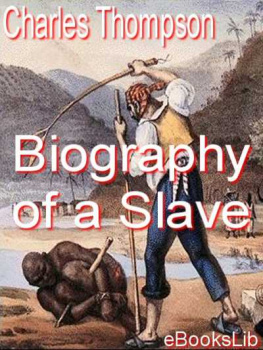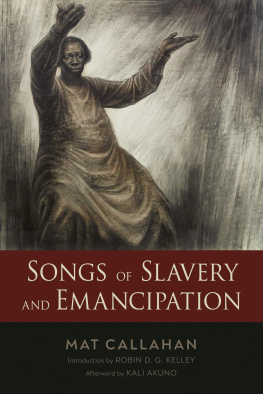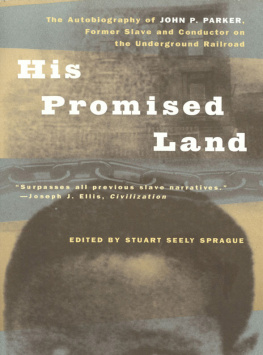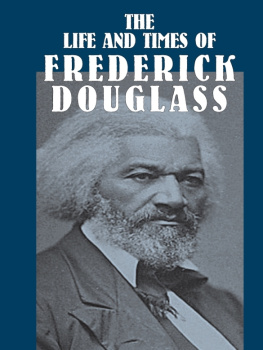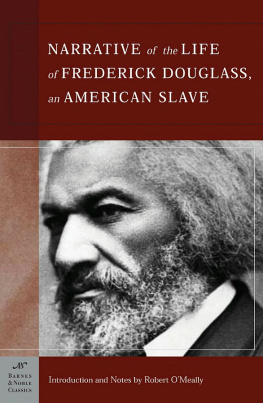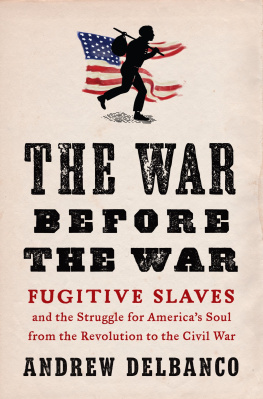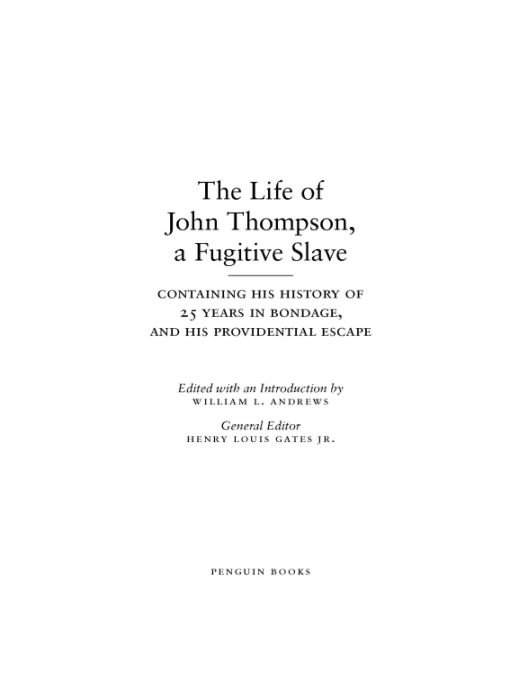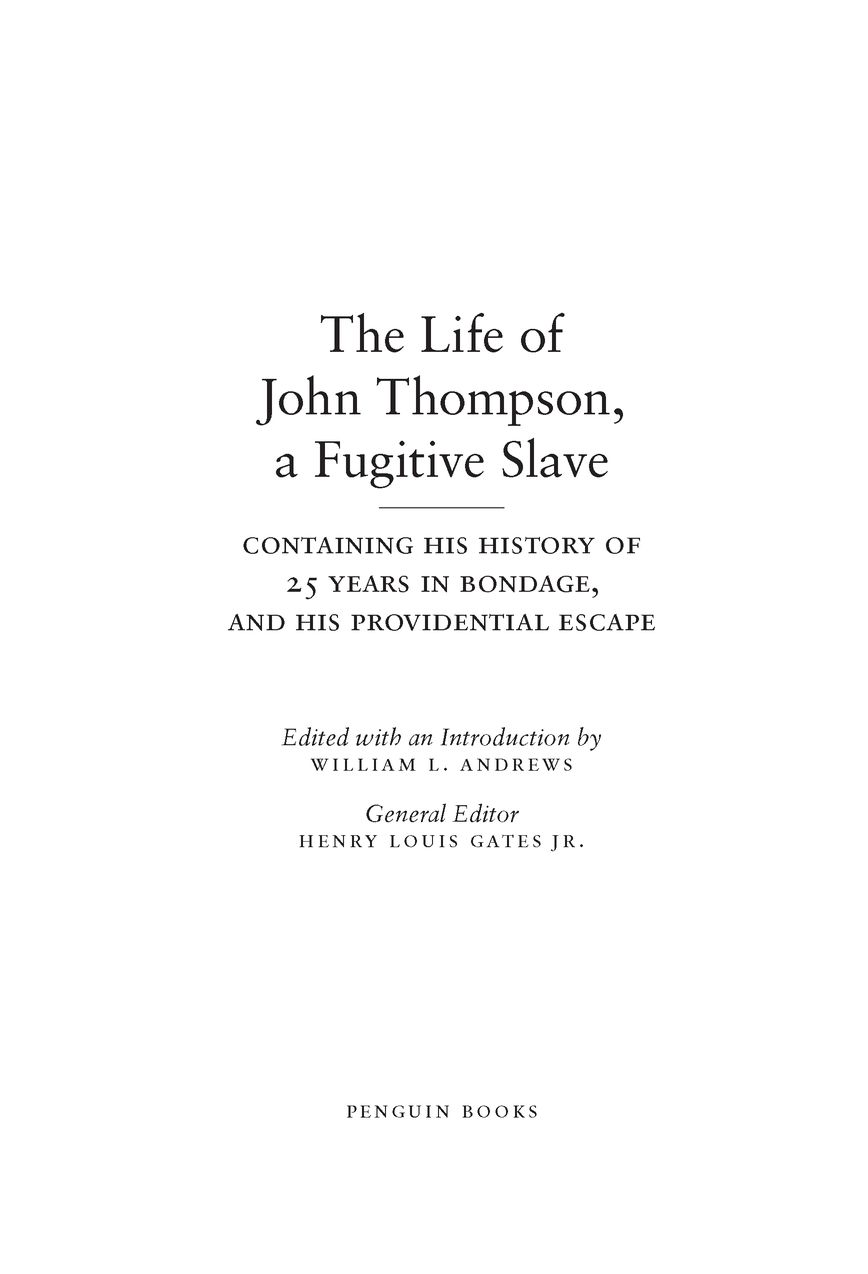Table of Contents
THE LIFE OF JOHN THOMPSON, A FUGITIVE SLAVE
JOHN THOMPSON was born into slavery on a Maryland plantation in 1812, one of seven children. Among his first memories was the sale of his oldest sister. During his boyhood, Thompson learned to read with the aid of his masters nephew and received the relative privilege of working as a body servant for his young master, John Wagar. Soon after the death of Wagars mother, the plantations owner, in 1822, the Thompson family was sold to another Maryland planter. As a teenager and young man, Thompson was hired out to a succession of planters, the majority of whom were abusive, callous, and indifferent to the welfare of their slaves. Toiling as an agricultural field hand, Thompson witnessed much horrific treatment, but he also recalls a number of slaves, himself among them, who resisted, sometimes violently, the cruelties inflicted on them. Hearing that his master planned to move to Mississippi, Thompson resolved to escape, heading north with a friend. He eluded tracking dogs and slave catchers with the help of sympathetic free blacks and, he affirms, the mighty power of God, before reaching Philadelphia.
Thompson married, joined the African Methodist Episcopal Church, and found work as a bricklayers assistant. To avoid being recaptured, he decided to go to sea. He misrepresented himself as an experienced steward to gain passage on a whaler but later earned the captains favor and proved himself an able seaman. Thompson remained at sea for two years before returning to his family. He moved to Worcester, Massachusetts, where his narrative was published in 1856. He died in 1860.
WILLIAM L. ANDREWS is E. Maynard Adams Professor of English and Senior Associate Dean for the fine arts and humanities at the University of North Carolina at Chapel Hill. He is the author of The Literary Career of Charles W. Chesnutt (1980) and To Tell a Free Story: The First Century of Afro-American Autobiography, 17601865 (1986); coeditor of The Norton Anthology of African American Literature (1997, 2003) and The Oxford Companion to African American Literature (1997); and general editor of The Literature of the American South: A Norton Anthology (1997) and North American Slave Narratives, a database and electronic text library. He has edited The Portable Charles W. Chesnutt (2008) and Chesnutts Conjure Tales and Stories of the Color Line (2000) for Penguin Classics.
HENRY LOUIS GATES JR. is Alphonse Fletcher University Professor and director of the W. E. B. Du Bois Institute for African and African American Research at Harvard University. He is editor in chief of the Oxford African American Studies Center and TheRoot.com, and host of Faces of America (PBS). Gates is general editor for a Penguin Classics series of African American works, including The Portable Charles W. Chesnutt, edited with an introduction by William L. Andrews; Gods Trombones by James Weldon Johnson, with a foreword by Maya Angelou; and Iola Leroy by Frances Ellen Watkins Harper, with an introduction by Hollis Robbins.
What Is an African American Classic?
I have long nurtured a deep and abiding affection for the Penguin Classics, at least since I was an undergraduate at Yale. I used to imagine that my attraction for these booksgrouped together, as a set, in some independent bookstores when I was a student, and perhaps even in some todaystemmed from the fact that my first-grade classmates, for some reason that I cant recall, were required to dress as penguins in our annual allschool pageant, and perform a collective side-to-side motion that our misguided teacher thought she could choreograph into something meant to pass for a dance. Piedmont, West Virginia, in 1956, was a very long way from Penguin Nation, wherever that was supposed to be! But penguins we were determined to be, and we did our level best to avoid wounding each other with our orange-colored cardboard beaks while stomping out of rhythm in our matching orange, veined webbed feet. The whole scene was madness, one never to be repeated at the Davis Free School. But I never stopped loving penguins. And I have never stopped loving the very audacity of the idea of the Penguin Classics, an affordable, accessible library of the most important and compelling texts in the history of civilization, their black-and-white spines and covers and uniform type giving each text a comfortable, familiar feel, as if we have encountered it, or its cousins, before. I think of the Penguin Classics as the very best and most compelling in human thought, an Alexandrian library in paperback, enclosed in black and white.
I still gravitate to the Penguin Classics when killing time in an airport bookstore, deferring the slow torture of the security lines. Sometimes I even purchase two or three, fantasizing that I can speed-read one of the shorter titles, then make a dent in the longer one, vainly attempting to fill the holes in the liberal arts education that our degrees suggest we have, over the course of a plane ride! Mark Twain once quipped that a classic is something that everybody wants to have read and nobody wants to read, and perhaps that applies to my airport purchasing habits. For my generation, these titles in the Penguin Classics form the canonthe canon of the texts that a truly well-educated person should have read, and read carefully and closely, at least once. For years I rued the absence of texts by black authors in this series, and longed to be able to make even a small contribution to the diversification of this astonishingly universal list. I watched with great pleasure as titles by African American and African authors began to appear, some two dozen over the past several years. So when Elda Rotor approached me about editing a series of African American classics and collections for Penguins Portable Series, I eagerly accepted.
Thinking about the titles appropriate for inclusion in these series led me, inevitably, to think about what, for me, constitutes a classic. And thinking about this led me, in turn, to the wealth of reflections on what defines a work of literature or philosophy somehow speaking to the human condition beyond time and place, a work somehow endlessly compelling, generation upon generation, a work whose author we dont have to look like to identify with, to feel at one with, as we find ourselves transported through the magic of a textual time machine; a work that refracts the image of ourselves that we project onto it, regardless of our ethnicity, our gender, our time, our place. This is what centuries of scholars and writers have meant when they use the word classic, anddespite all that we know about the complex intersubjectivity of the production of meaning in the wondrous exchange between a reader and a textit remains true that classic texts, even in the most conventional, conservative sense of the word classic, do exist, and these books will continue to be read long after the generation the text reflects and defines, the generation of readers contemporary with the texts author, is dead and gone. Classic texts speak from their authors graves, in their names, in their voices. As Italo Calvino once remarked, A classic is a book that has never finished saying what it has to say.


